Columns
Hardship Grant controversy: More States Dispute FG’s Claim of Disbursing N573 Billion Grant
Published
8 months agoon
By
Ekwutos Blog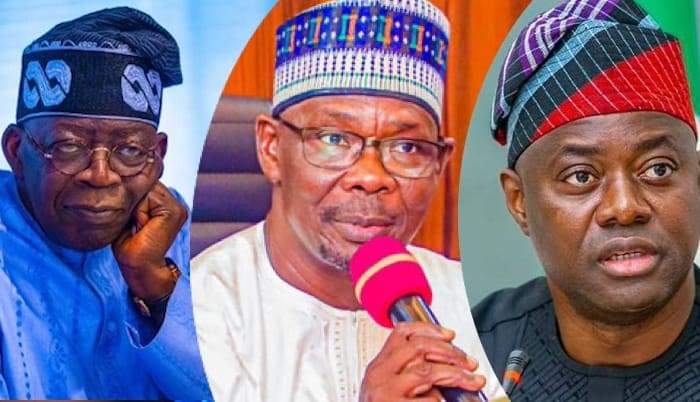
More states have refuted President Tinubu’s claim of a N573bn hardship fund, clarifying it’s a World Bank loan, not a grant.
The controversy surrounding the purported disbursement of N573 billion to subnational governments announced by President Bola Tinubu during a nationwide broadcast on Sunday, continued on Friday, as more States denied receiving such fund from his administration.
Just like the Governor of Nasarawa State, Abdullahi Sule, on Thursday, faulted the claim by the President, Governor of Oyo State, Seyi Makinde, yesterday, also denied receiving the N573 billion hardship grant claimed to have been given to the state governments by the federal government.
Abia and Osun State governments also indicated that they were yet to receive such funds, maintaining that the World Bank intervention was a loan to States and not a grant from the Nigerian government. Other states contacted also declined to comment, in an apparent move not to be seen as being in conflict with the President.
Tinubu had while addressing Nigerians in a broadcast during the #EndBadGovernance nationwide protests against hunger and hardship, said the government had disbursed N573 billion to the 36 states.
However, in a newsletter No 95 |August 2024 personally signed by Makinde, which was shared on his X handle, he said the state was not in the know of such a grant.
Makinde explained: “In my newsletter tonight, I responded to a question from a concerned citizen of Oyo State regarding the claim that the Federal Government ‘gave’ States over N570 billion as some kind of ‘hardship fund’ for citizens.
“Before I speak more on further actions we have taken to show our commitment to productivity and sustainability, let me respond to a long message I received earlier in the week from a concerned citizen. The message was about a purported N570 billion Hardship Fund “given” to the 36 States by the Federal Government. I was queried about what I used the money for.
“Let me state categorically that this is yet another case of misrepresentation of facts. The said funds were part of the World Bank-assisted NG-CARES project—a Programme for Results intervention.
“The World Bank facilitated an intervention to help States in Nigeria with COVID-19 Recovery. CARES means COVID-19 Action Recovery Economic Stimulus. It was called Programme for Results because States had to use their money in advance to implement the programme. After the World Bank verified the amount spent by the State, it reimbursed the States through the platform provided at the Federal level. The Federal Government did not give any State money; they were simply the conduit through which the reimbursements were made to States for money already spent.
“It is important to note that the World Bank fund is a loan to States, not a grant. So, States will need to repay this loan. Note also that NG-CARES, which we christened Oyo-CARES in our State, predates the present federal administration.
“So, in direct response to the message, the Federal Government did not give Oyo State any money. We were reimbursed funds (N5.98 billion in the first instance and N822 million in the second instance) we invested in the three result areas of NG-CARES, which includes inputs distribution to smallholder farmers within our State. In fact, when the World Bank saw our model for the distribution of inputs preceded by biometric capturing of beneficiary farmers, they adopted it as the NG-CARES model.”
Makinde’s denial comes on the heels of controversies that greeted the nationwide hunger and hardship protests.
Also, Abia State Commissioner for Finance, Mr. Mike Akpara, in response to THISDAY’s enquiry, said the federal government’s comment about the purported grant “is vague”.
“They should come out clear and state categorically what they gave each state,” he said, adding that when that is done, governors could be held accountable on how they spent the money.
Akpara, expressed doubt if the federal government was sure of its claims on the disbursement of the said grant to states and wondered if the amount was calculated based on the rice it distributed to states or other forms of palliatives.
According to him, loans are applied for, negotiated and processed on individual basis and any state that needed loan would pursue it without recourse to other states as a group.
Also, responding to THISDAY’s enquiries, a source from Osun State government that pleaded to remain anonymous, said the N573 billion hardship grant claimed to have been given to the state governments by the federal government was not the truth.
Governor Sule had in an interview with Channels Television, stressed that the World Bank loan received by states was for infrastructural projects and not to cushion the effects of hardship faced by Nigerians.
The governor had explained that states received the money in batches with the latest received in June, stressing that it was a loan and not free funds and was initiated in 2020.
“The money is tied to certain projects. It is almost like a regimented loan from the World Bank. The money is not for rice, it is not for palliatives, it is not for anything in that line.
“That money came from the World Bank and that was the second disbursement which came in November last year. The amount was credited to the account of every other state, sometime around January.”
Many Nigerians, including a senior lawyer, Mr. Femi Falana, a human rights crusader and the Chair, of Alliance on Surviving Covid-19 and Beyond (ASCAB), had since the announcement by the President been challenging states and the Federal Capital Territory (FCT) to explain how they spent the N573 billion.
Follow Ekwutosblog to stay informed of all the latest updates
You may like
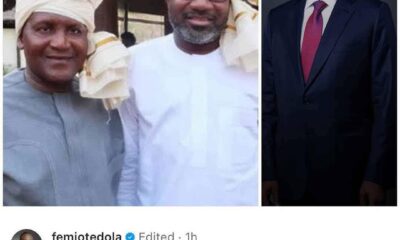

Billionaire Femi Otedola Pays Tribute to Aliko Dangote on His 68th Birthday


Nigerian Railway Corporation suspends warri-Itakpe train service, gives reason
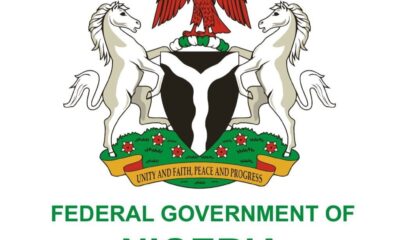

Presidency unveils committee to trickle down federal policies to community dwellers
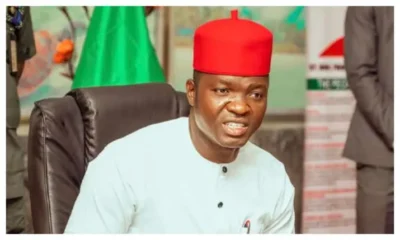

Ebonyi: Amasiri on fire – Lawyer raises alarm over military invasion as communities clash


NBC bans media from broadcasting Eedris Abdulkareem’s new song, Seyi Tell Your Papa.


Trump and Musk mocked in new AI video showing them as factory workers
Columns
Fubara’s chief of staff files N2bn suit against Ex-HoS Nweke, Channels TV
Published
5 hours agoon
April 10, 2025By
Ekwutos Blog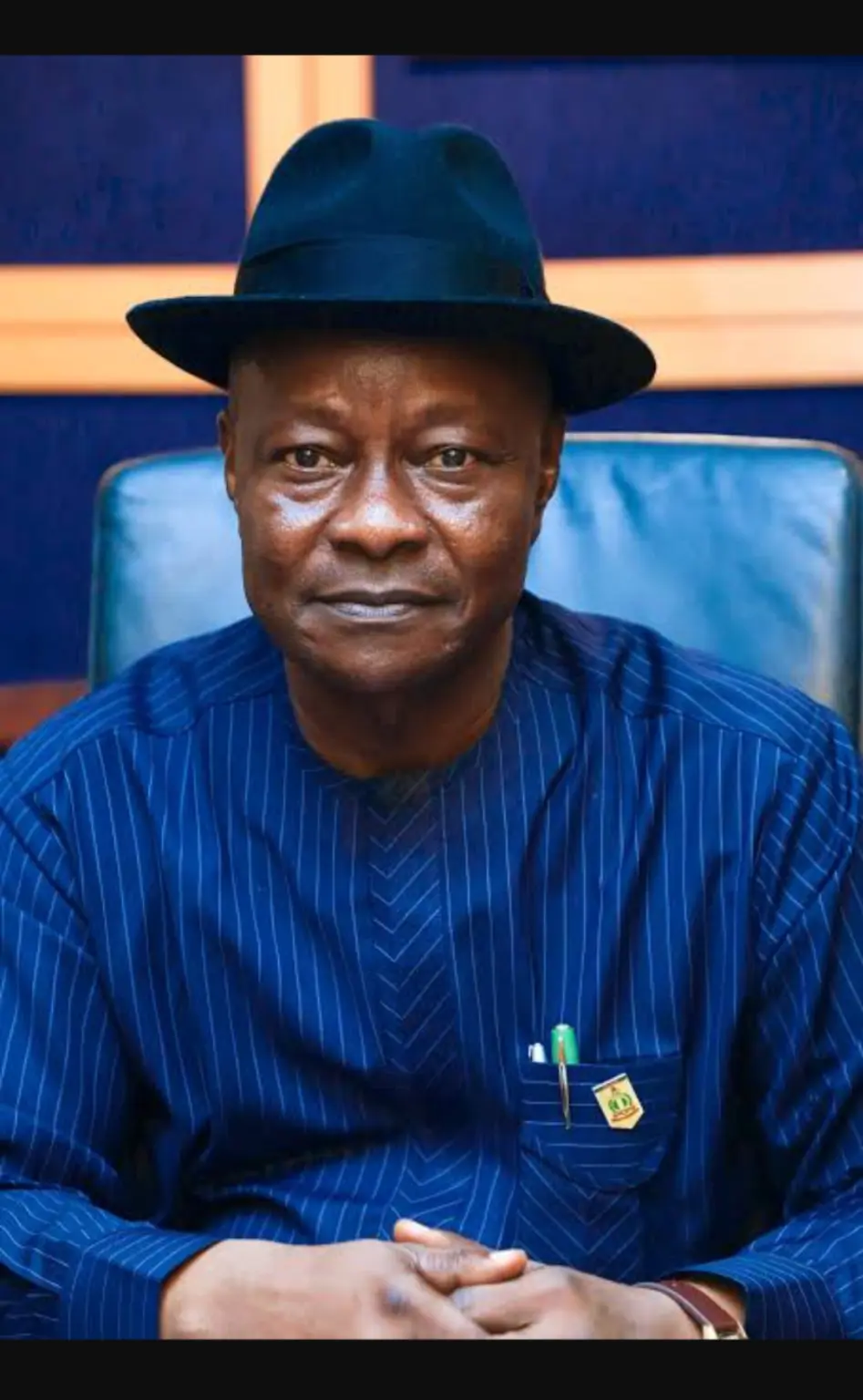
Edison Ehie, the Chief of Staff to suspended Rivers State Governor Siminalayi Fubara, has filed a N2 billion defamation lawsuit against the immediate past Head of Service of the state, George Nweke, and Channels Television.
Ehie is urging the court, presided over by Justice Stephen Jumbo, to award the sum as damages in his favour.
This follows a televised interview of Nweke on Channels Television on March 29, which Ehie claims was baseless, malicious, and falsely published in a most wicked manner.
When the matter came up in court on Thursday, Ehie’s counsel, Tuduru Edeh, SAN, sought a perpetual injunction restraining the defendants, whether by themselves, their agents, privies, servants, or any other representatives, from further publishing or disseminating the said defamatory content.
The plaintiff’s counsel also prayed the court to compel the defendants to immediately retract the publication and issue a public apology to Ehie.
The apology, he requested, should be broadcast on Channels Television, another national television network, and published in two widely read newspapers across Nigeria.
Justice Jumbo, in ruling on the application, granted the orders and directed all parties in the suit to refrain from making further public comments on the matter, pending the determination of the case.
The matter was adjourned to June 4, 2025, for mention and further proceedings.
Columns
CHALLENGES OF TERRORISM REQUIRES HOLISTIC AND MULTIFACETED APPROACH- SENATOR GAIDAM
Published
19 hours agoon
April 10, 2025By
Ekwutos Blog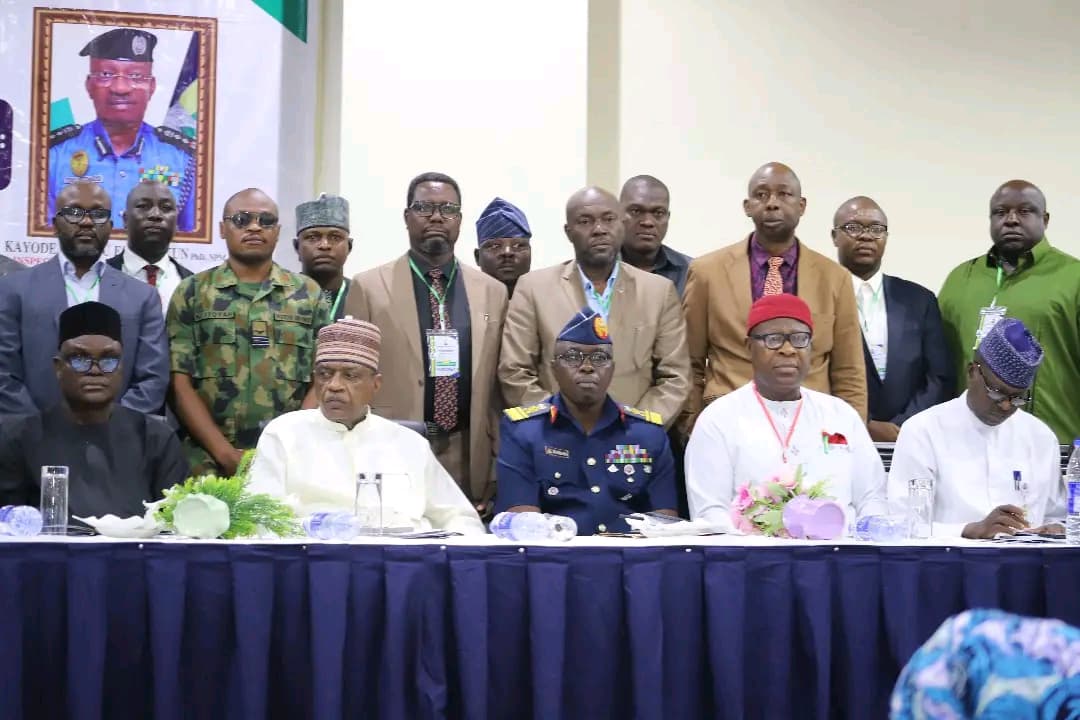
The Honourable Minister of Police Affairs, Senator Ibrahim Gaidam has pointed out that addressing the challenge of terrorism requires a holistic and multifaceted approach among the security agencies
He stated this during the Stakeholders Conference on Security with a theme “A Path to Regional Cooperation” organized by the Ministry of Police Affairs in conjunction with the Nigeria Police Force and National Central Bureau (NCB) at the Rockview Hotels, Abuja.
Gaidam stated that implementing the International Standard and good practice of sound, modern, integrated, and cooperative border management will go a long way in putting an end to this threat.
He urged all stakeholders present at the conference to work collaboratively towards a shared vision of security. “We can overcome these challenges and emerge as a beacon of stability and progress in Africa if all hands are put on deck”. Gaidam stressed.
The Minister opined that the objective of this conference is to deliberate on the way forward to achieving a stable regional security thereby focusing on strategies to strengthen collaboration among Interpol member countries in West Africa with a view to fostering partnerships to share intelligence, expertise and approaches for combating trans-border crimes.
In his words, “Ladies and gentlemen, it is pertinent to state that the administration of President Bola Ahmed Tinubu GCFR has worked immensely to curb the insurgency caused by Boko Haram, Bandits and other transnational crimes. Some of these measures include biometric system at border checkpoint, integration of data analytics into border security operations and deployment of surveillance drones along critical border regions”.
Gaidam observed that despite Government’s efforts to end the menace of terrorism and violent extremism in the country, the threat posed by terrorism has risen significantly adding that Nigeria was ranked 6th most impacted country globally according to the 2024 Global Terrorism Index.
He enumerated Government to mitigating insecurity which include deploying the military, cooperating with international partners, implementing counter-terrorism legislation; adoption of a legal framework related to the West African Police Information System (WAPIS); provision of (WAPIS) terminals to allow security agencies access to critical information and Establishment of National Criminal Data Fusion Center (NCDFC) for the Nigerian Police Force.
In his goodwill message the Chairman Police Service Commission, DIG Hashimu Salisu (RTD) represented by Director Police Discipline, Ferdinand Uchechukwu Ekpe, stated that no nation can afford to stand alone in the face of threats and insurgency, noting that a secure and peaceful Nigerian state is necessary for a secure and prosperous West Africa and the entire ECOWAS market area.
Also, the Chairman, National Drug Law Enforcement Agency (NDLEA) Brigadier General Mohammed Buba Marwa (RTD) represented by Director Intelligence Kennedy Zirangey in his good will message states that, the conference came at the right time where the nation is faced with insecurity such as terrorism, banditry, insurgency, kidnapping, community conflicts and myriads of other security challenges adding that all the catalyst behind these insecurity threats is drug usage by the foot soldiers perpetrating these crimes.
Earlier, the Inspector General of Police, Kayode Adeolu, represented by Deputy Inspector General Logistics and Supplies DIG A. A. Hamzat, said that the convergence of illicit drugs, small arms, and light weapons in the hands of criminal elements continues to fuel organized crime and extremism, adding that weak border enforcement mechanisms. Fragmented intelligence sharing systems exacerbate the situation.
Columns
Trump’s tariffs: Why won’t countries buy US meat products?
Published
1 day agoon
April 9, 2025By
Ekwutos Blog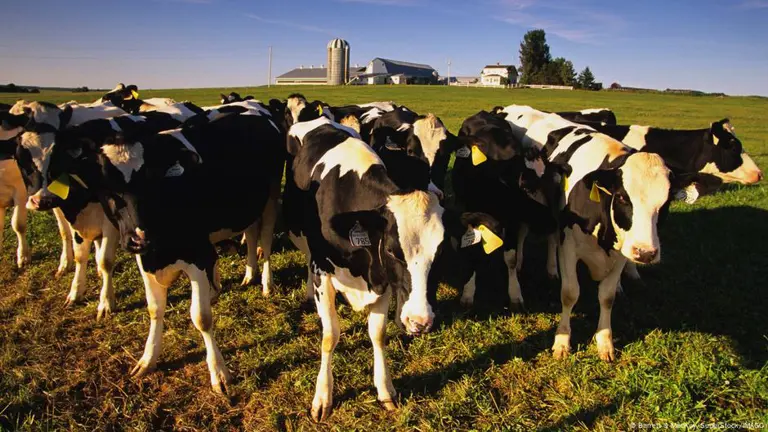
US President Donald Trump wants other countries to import more American beef and poultry. Several countries restrict importing these products for decades because they don’t meet their food safety regulations.
In an announcement on April 2, Trump called out Australian restrictions on US beef, saying: “We imported $3 billion of Australian beef from them just last year alone. They won’t take any of our beef.”
His administration also singled out the UK and EU for “non-science-based” restrictions on importing US beef, and Argentina for its ban of live US cattle exports.
Trump has used these import bans as part of his rationale to impose new trade tariffs.
Who do countries ban US beef imports?
There are different reasons why Australia, Argentina, the EU and the UK don’t import some American beef products.
For Australia and Argentina, the restrictions date back to 2003 when bovine spongiform encephalopathy (BSE) was detected in US cattle. BSE is a disease which affects the nervous system of cattle caused by misfolded proteins known as prions. It’s also known as Mad Cow Disease.
Humans can become infected with the disease when they eat meat contaminated with BSE. It is known as Creutzfeldt-Jakob disease in humans. Globally, a total of 233 people have died from Creutzfeldt-Jakob disease after eating BSE-infected.
US health authorities reduced the spread of BSE among US cattle sufficiently to see the ban on beef exports to Australia lifted in 2019.
“There may be a feeling from some producers or companies in the US that Australia is banning US beef, but there’s no ban in place,” said Robyn Alders, a veterinary scientist at the Australian National University.
But US imports are still restricted if they don’t meet Australia’s strict biosecurity laws. For US beef to be allowed into Australia, US cattle farmers must prove their cattle are entirely bred, grown and slaughtered in the US.
“To do that [tracing] in a way that would still make their product a cost-efficient thing to ship that product across to Australia, there are very few companies — virtually none at the moment — that are willing to take that on,” Alders said.
Argentina lifted its BSE ban on American beef products in 2018 but has maintained the restriction on live cattle imports until the two countries finalize a new “sanitary certificate”.
No added hormones for Europe and the UK
The EU and UK have restricted US beef imports since 1989 because the US cattle industry sometimes uses growth hormones to increase meat and milk yields. The EU does import non-hormone-treated beef from the US.
US dairy and cattle farmers routinely use hormones like estradiol 17ß and testosterone to promote faster growth and improve feed efficiency.
The EU’s ban rationale, which is also maintained by the UK post-Brexit, is based on its own scientific evaluation showing that daily intake of growth hormones can have negative health impacts, including evidence that estradiol 17ß can cause cancerous tumor growth.
The US cattle industry has argued against the EU’s restrictions, saying food safety testing in the US shows no risk to adult health.
“[However], the European perspective is that the entire population does not consist only of health adults, but [also] of infants, children, the elderly, the immunologically compromised,” said Erik Millstone, an expert in food and science policy at the University of Sussex, UK.
“EU authorities have done a much more comprehensive assessment of the risk of consuming hormone-treated beef [compared to US authorities],” Millstone said.
Chlorinated chicken banned in Europe too
The US has also criticized EU bans on importing US poultry that has been cleaned in chlorine.
US poultry farmers wash poultry meat in chlorine solutions to kill harmful bacteria such as campylobacter, which commonly causes food poisoning.
The European Food Safety Authority (EFSA) has said that chemical substances in poultry meat are unlikely to pose a health risk for consumers.
However, European authorities are concerned that rinsing chicken in chlorine at the end of the food production process allows lower standards of hygiene and animal welfare in earlier stages. EU regulations legislate animal welfare at all stages of the “farm to fork” process.
Millstone also that some research shows that chlorine rinsing may not actually have the intended effect of decontaminating meat.
“The chlorinated water was not an effective disinfectant. The bacteria remained in place, remained pathogenic, remained dangerous, infectious, but were just not detected,” Millstone said.
As a result, rates of bacterial food poisoning in the US are substantially higher than they are in the European Union or UK, said Millstone.
What do US producers need to do?
For the time being, US animal farming practices are either incompatible or too impractical to meet the food safety demands of export markets.
Australia and Argentina are open to importing US beef, but US producers must meet their regulatory standards.
For the UK and EU, it’s a more difficult path, which would require US producers to cease using growth hormones in beef production and end the practice of chlorine washing in poultry.
Polling data suggest Europeans are against allowing US meat products in — a 2020 poll found 80 per cent of the British public are against allowing imports of chlorinated chicken.

Billionaire Femi Otedola Pays Tribute to Aliko Dangote on His 68th Birthday

Nigerian Railway Corporation suspends warri-Itakpe train service, gives reason

Presidency unveils committee to trickle down federal policies to community dwellers
Trending

 Trending6 months ago
Trending6 months agoNYA demands release of ‘abducted’ Imo chairman, preaches good governance
- Business6 months ago
US court acquits Air Peace boss, slams Mayfield $4000 fine

 Politics6 months ago
Politics6 months agoMexico’s new president causes concern just weeks before the US elections
- Entertainment6 months ago
Bobrisky transferred from Immigration to FCID, spends night behind bars
- Entertainment6 months ago
Bobrisky falls ill in police custody, rushed to hospital

 Politics6 months ago
Politics6 months agoRussia bans imports of agro-products from Kazakhstan after refusal to join BRICS

 Politics6 months ago
Politics6 months agoPutin invites 20 world leaders
- Politics1 year ago
Nigerian Senate passes Bill seeking the establishment of the South East Development Commission.

